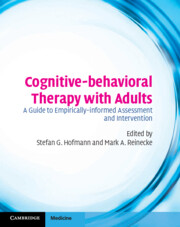 Cognitive-behavioral Therapy with Adults
Cognitive-behavioral Therapy with Adults Book contents
- Cognitive–behavioral Therapy with Adults
- Cognitive–behavioral Therapy with Adults
- Copyright page
- Contents
- Contributors
- Foreword
- Introduction
- 1 Cognitive therapy for depression
- 2 Bipolar disorder
- 3 Generalized anxiety disorder
- 4 Social anxiety disorder
- 5 Specific phobia
- 6 Panic disorder and agoraphobia
- 7 Obsessive–compulsive disorder
- 8 Post-traumatic stress disorder
- 9 Eating disorders
- 10 Schizophrenia and psychotic disorders
- 11 Body dysmorphic disorder
- 12 Mindfulness in cognitive–behavioral therapy
- Index
1 - Cognitive therapy for depression
Published online by Cambridge University Press: 10 November 2010
- Cognitive–behavioral Therapy with Adults
- Cognitive–behavioral Therapy with Adults
- Copyright page
- Contents
- Contributors
- Foreword
- Introduction
- 1 Cognitive therapy for depression
- 2 Bipolar disorder
- 3 Generalized anxiety disorder
- 4 Social anxiety disorder
- 5 Specific phobia
- 6 Panic disorder and agoraphobia
- 7 Obsessive–compulsive disorder
- 8 Post-traumatic stress disorder
- 9 Eating disorders
- 10 Schizophrenia and psychotic disorders
- 11 Body dysmorphic disorder
- 12 Mindfulness in cognitive–behavioral therapy
- Index
Summary
Information
- Type
- Chapter
- Information
- Cognitive-behavioral Therapy with AdultsA Guide to Empirically-informed Assessment and Intervention, pp. 1 - 17Publisher: Cambridge University PressPrint publication year: 2010
Accessibility standard: Unknown
Why this information is here
This section outlines the accessibility features of this content - including support for screen readers, full keyboard navigation and high-contrast display options. This may not be relevant for you.Accessibility Information
- 1
- Cited by